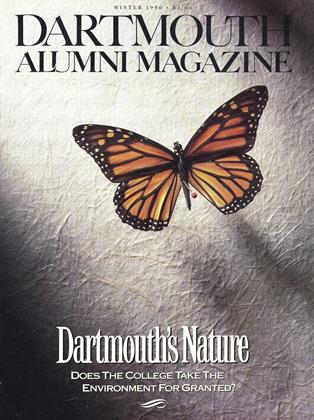• The Art Ensemble of Chicago, "Urban Bushmen" (ECM 829394-2, 1982)—The ensemble's unique mixture of inspired music and theater (not unlike Sun Ra) ranges from Lester Bowie's touching piece "New York Is Full of Lonely People" to atmospheric percussion pieces by Famoudou Don Moye.
• The Big Carla Bley Band, "Fleur Carnivore" (Watt/ECM 839662, 1989)—Pianist and composer Carla Bley has an attractively simple, funny, and direct style. Though she languished during much of the eighties, this new recording proves that she has not lost her orchestral touch.
• Lester Bowie's Brass Fantasy, "Avant Pop" (ECM 829563, 1986) In my opinion, Lester Bowie, not Wynton Marsalis, is the most creative trumpet player of his generation. This nine-piece group is everyone's brass fantasy.
• Gil Evans and the Monday Night Orchestra, "Live at Sweet Basil" (2-Gramavision 79442, 1986)—Pianist, conductor, composer, and arranger Gil Evans will always be remembered best for his beautiful settings for Miles Davis in the late 1950s ("Miles Ahead," "Porgy & Bess," and "Sketches of Spain"). For much of the 1980s, however, Evans was at the helm of one of the more loosely structured, spontaneous big bands ever heard. This recording captures them live at the New York club, Sweet Basil.
• Jerry Gonzalez and the Fort Apache Band, "Ya Yo Me Cure" ("Now lam Cured.") (Pangea 6242, 1980)—In the late seventies, the Puerto Rican congalero and trumpeter Jerry Gonzalez gathered about a dozen players who truly understood both the Latin and the jazz traditions and recorded this, one of my all-time favorite albums.
• Charlie Haden and the Liberation Music Orchestra, "The Ballad of the Fallen" (ECM 811546,1983) A dozen of the best jazz musicians—including pianist Carla Bley, trumpeter Don Cherry, tenor saxophonist Dewey Redman, and drummer Paul Motianplay hauntingly beautiful arrangements of songs from Chile, El Salvador, and the Spanish Civil War.
• Abdullah Ibrahim, "Ekaya" ("Home") (Blackhawk BKH 50205, 1983) Expatriot South African pianist and soprano saxophonist Abdullah Ibrahim composes and performs some of the most striking jazz I know.
• Bobby McFerrin, "The Voice" (Elektra/Musician 60366, 1984)—Before "Don't Worry, Be Happy," there was "The Voice." Bobby McFerri, the son of Metropolitan Opera singer Robert McFerrin, started off as a nondescript jazz piano player. In 1977 he heard a voice in his head telling him that he should be a singer, so he started singing. In 1984 he fired his backup jazz trio and went solo. "The Voice" is the result.
• New Orleans Brass Bands, "Down Yonder" (Rounder 2062,1989)—Black brass bands in New Orleans are currently enjoying a renaissance of activity and attention, and the best of these bands are documented on this Rounder sampler: Dejean's Olympia Brass Band, The Chosen Few Brass Band, The Rebirth Marching Jazz Band, and the group which sparked this revival, the Dirty Dozen Brass Band.
• Archie Shepp and Horace Parian, "Goin' Home" (Steeplechase 1079, 1977) and "Trouble in Mind" (Steeplechase 1139, 1980); Archie Shepp and Niels-Henning Orsted Pedersen, "Looking at Bird" (Steeplechase 1149, 1981)—Saxophonist Archie Shepp, a former "angry young man," brings techniques of avant-garde jazz to his interpretations of Afro-American spirituals, blues, and bebop.
• Sun Ra, "Blue Delight" (A&M 5260, 1989)—Sun Ra believes that he comes from Saturn, was never born, and will never die. Any questions? "Blue Delight" is his mixture of "space-vamp" tunes, up-tempo swing, and improbable standards.
• The World Saxophone Quartet, "The World Saxophone Quartet Plays Duke Ellington" (Elektra/Nonesuch 79137, 1986)—With most groups it is easy to tell when they are improvising and when they are not, but not the World Saxophone Quartet. Hearing standards by Ellington and Strayhorn arranged and performed by the quartet is an ear-opening delight.
 View Full Issue
View Full Issue
More From This Issue
-
 Feature
FeatureWHEN THE YOUNG TURKS CAME
December 1990 By John G. Kemeny -
 Cover Story
Cover StoryDartmouth’s Nature
December 1990 By Jonathan Kohl ’92 -
 Feature
FeatureHENRY’S SPIEL
December 1990 -
 Article
ArticleDR. WHEELOCK’S JOURNAL
December 1990 By E. Wheelock -
 Article
ArticleThe Case Against the Dartmouth Review
December 1990 By George B. Munroe -
 Class Notes
Class Notes1980
December 1990 By Michael H. Carothers







